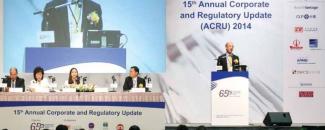Capital market regulators have twin roles – as law enforcers and as market supervisors. While the former role is very well recognised in the market, the latter role is much less familiar. Regulators attending this year's Annual Corporate and Regulatory Update (ACRU) emphasised, however, that the supervisory role is just as important in maintaining market standards. Enforcement actions give a regulatory system its credibility, but supervisory actions help to identify and prevent problems before they escalate into major compliance failures.
‘The role of the Exchange, as the frontline regulator of companies, is not only to enforce the listing rules but also to educate the market and influence compliance culture and attitudes,’ said Stephen Jamieson, Head of Enforcement, Listing Department, Hong Kong Exchanges and Clearing Ltd (the Exchange) in session 1 of the seminar.
‘We are not a law enforcement agency,’ he reminded his audience. The Exchange reports conduct which may amount to possible breaches of the law to the Securities and Futures Commission (SFC) and other law enforcement agencies such as the Independent Commission Against Corruption and the Commercial Crime Bureau, and will suspend its own investigations if they overlap with investigations by these bodies to avoid duplication of regulatory resources and possible prejudice to their enforcement action.
These law enforcement agencies ensure that companies abide by their legal obligations, but the Exchange's supervisory role, Mr Jamieson pointed out, focuses on upgrading companies’ internal controls and corporate governance standards to deter future breaches of the rules.
Seeking dialogue
In the second session of the day, ACRU participants learned that the SFC, despite its primary role as an enforcement agency, is just as keen to engage its regulatees. Michael Duignan, Senior Director – Corporate Finance Division, SFC, focused his presentation on the role and work of the Commission's new Corporate Regulation Team. Since it was created in December last year, the Corporate Regulation Team, which Mr Duignan heads, has been seeking a constructive dialogue with companies in Hong Kong. ‘We are seeking to increase the level of compliance culture within companies and improve general corporate behaviour,’ he said. 'The SFC does not supervise listed companies so the levers we use are less direct, but big sticks can only take you so far’, he added.
Since the SFC is much better known for its enforcement role, a call from the Commission might well be cause for alarm. In the Q&A concluding the SFC's ACRU session, Mohan Datwani FCIS FCS, Solicitor and Accredited Mediator, Director, Technical and Research, HKICS, and the MC for this year's ACRU forum, asked Mr Duignan how a company should respond if it gets a call from the Corporate Regulation Team.
‘That depends on what we're asking for,’ he replied. 'We might just be asking for information, or we might be asking for help in trying to assess market views. I want to have a constructive dialogue with companies, I don’t want to be in an ivory tower in the Cheung Kong building. We consider it a success if a company calls us to say: “you should really look into this".'
Some tensions inevitably exist, however, between the twin roles of regulators in Hong Kong. For example, Mr Duignan stressed that there are limits to how much guidance the SFC can provide to companies seeking to comply with Hong Kong's new statutory inside information regime.
The SFC has issued guidance on this challenging area for compliance, including its Guidelines on Disclosure of Inside Information, the many FAQs on its website devoted to this area, and the consultation service it launched before the revised Securities and Futures Ordinance (SFO) was implemented in January 2012. Perhaps not surprisingly, the consultation service has been heavily subscribed, but Mr Duignan pointed out that the service cannot answer specific questions regarding whether a piece of information is 'inside information’, or whether it is covered by one of the ‘safe harbours’ in the SFO. Ultimately these judgements have to be made by the companies themselves since everything depends on the specific circumstances involved, he said.
If a caller to the consultation service asks, for example, whether a company needs to disclose the identity of new shareholders, the answer might seem to be obviously no. But if that new shareholder happens to be Warren Buffet, clearly this information would have an effect on the share price. 'So, as a regulator, you can’t make the judgement for companies,’ Mr Duignan said.
He added that getting legal advice is not a 'get out of jail free' card. He quoted a recent comment by a judge in a case in Ireland – 'if a lawyer says murder is legal it doesn’t prevent you from being prosecuted.’ The company secretary does have an important role to play, however. 'I wouldn’t go as far as saying that the company secretary is “our man in the room”, but certainly he is the person who needs to alert directors to the risks involved', Mr Duignan said.
Understanding regulators’ expectations
Another related theme to emerge from this year's ACRU was the need to understand regulators’ expectations of market behaviour.
Mr Jamieson emphasised that the Exchange is keen to enhance the transparency of the processes involved in its enforcement of the listing rules. To this end, in September 2013, the Exchange published two statements designed to give market participants a much better understanding of the Exchange's continuing expectations (see 'Statement of Enforcement Policy Strategy’ and the 'Statement’ annexed to 'New Procedures’, available at: http://www.hkex.com.hk/ eng/rulesreg/listrules/listguid/documents/ enfs_0913.pdf).
Mr Jamieson urged market participants to read these statements since they explain the factors the Exchange considers when determining the appropriate level of its enforcement action. While the sanctions available to the Exchange are lighter than those available to law enforcement agencies, they can involve trading suspensions and even cancellation of listing.
As you might expect, the Exchange will consider the seriousness of the breach and the risk of prejudice to investors, but there are a number of other factors set out in the statements which are rather less obvious and will help companies minimise their regulatory risks. For example, the Exchange will consider the level of cooperation received from the issuer and its directors during the investigation.
Mr Jamieson reminded his audience that listing rule 2.12A imposes an obligation on issuers to provide as soon as possible, or in accordance with time limits imposed by the Exchange:
- information the Exchange reasonably considers appropriate to protect investors or ensure smooth operation of the market, and
- any other information or explanation that the Exchange may reasonably require for investigating a suspected rule breach or verifying rule compliance.
The Exchange will also look at whether the directors and senior management have implemented and maintained adequate and effective internal controls. The Exchange is interested to see whether the company has a corporate culture conducive to rule compliance. If a breach of the listing rules reveals failings in a listed company's internal controls, further breaches are likely and the Exchange needs to step in. Moreover, where serious or systemic weaknesses are identified in the company's internal controls, the enforcement action is likely to include the appointment of compliance advisers and a mandatory internal control review.
In the same spirit of transparency, ACRU participants also learned about the work processes of the SFC's Corporate Regulation Team. The team, as you might expect, reviews all corporate announcements to ensure that the Commission can identify potential problems as they emerge.
The results can sometimes be surprising. For example, Mr Duignan cited the fact that 86% of the inside information announcements made in 2013 did not actually lead to any market movement. The surge in inside information announcements over the past year (4,883 were made in 2013, as compared to 3,205 in the previous year) would appear to show that Hong Kong's statutory inside information regime has been very successful. But the fact that so few of these announcements actually led to a movement in the share price, casts doubt on whether the information disclosed was actually inside information.
Mr Duignan conceded, however, that the SFC has the benefit of hindsight. Predicting market movements is not easy. If the analysts, he quipped, who tell us so knowledgeably why the market moved the way it did in their summary of the day's trading could predict what it was going to do tomorrow, they wouldn’t be in TV, they’d be in hedge funds and very rich.
Nevertheless, companies do need to consider carefully how to label their announcements, he added. Labels such as 'voluntary announcement’, or 'overseas regulatory announcement’, or 'regular update' are clearly inappropriate if the disclosure contains inside information.
Mr Duignan also cautioned against the use of vague, generic terms like 'a significant increase', or 'a material increase', or even 'record a profit as compared to a loss’ in profit alerts. Mr Duignan pointed out that profit alerts need to contain supporting numbers – at least a profit range – otherwise they are meaningless. He advised companies to ensure that their intended disclosures are accurate, clear and comprehensive and adequate for investors to make an informed decision.
Thematic enforcement
Another theme to emerge from this year's ACRU was the trend towards 'thematic enforcement’ by regulators. Mr Jamieson said that the Exchange groups cases linked by a common theme as this makes for a more efficient use of resources and means that any lessons learned in that particular area of practice can be communicated to the market.
A question from the floor in the Q&A concluding the Exchange's session asked what the Exchange has been
doing since PSI disclosure enforcement went to the SFC. Mr Jamieson identified a number of different themes the Exchange has been focusing on, including:
• failure to comply with shareholder approval requirements for connected or notifiable transactions
• directors’ securities dealings in breach of the Model Code
• compliance with directors' undertaking to cooperate with the Exchange's investigations
• late financial reporting, and • Rule 3.08 compliance.
Rule 3.08 refers to the revised directors’ duties obligations brought in by the Exchange in 2012. In particular, Mr Jamieson emphasised the importance of directors staying informed about their company's affairs. Rule 3.08 was expanded to include an obligation for directors to take an active interest in their company's affairs, obtain general understanding of the business and follow up on anything untoward that comes to their attention.
‘I have seen on many occasions examples of directors simply not aware of what is going on in a company,' Mr Jamieson said.
The SFC also seeks to identify problematic areas of market practice before they escalate. Mr Duignan warned, however, that identifying 'red flags’ is not always predictive of market misconduct. For example, 'qualified accounts’ may seem to be an obvious red flag – why was the auditor unable to give true and fair view of the financial statements? Subsequent investigations, however, may not confirm suspicions of an underlying problem. 'We have a long list of red flags,’ said Mr Duignan, 'but we are still trying to work out whether any of them are actually predictive.’
The Institute's 15th Annual Corporate and Regulatory Update seminar took place on 5 June 2014. More photos of the event are available in this month's Institute News section and on the HKICS website: www.hkics.org.hk.
The second cover story this month (see the following pages) covers other major compliance issues covered by this year's ACRU.



